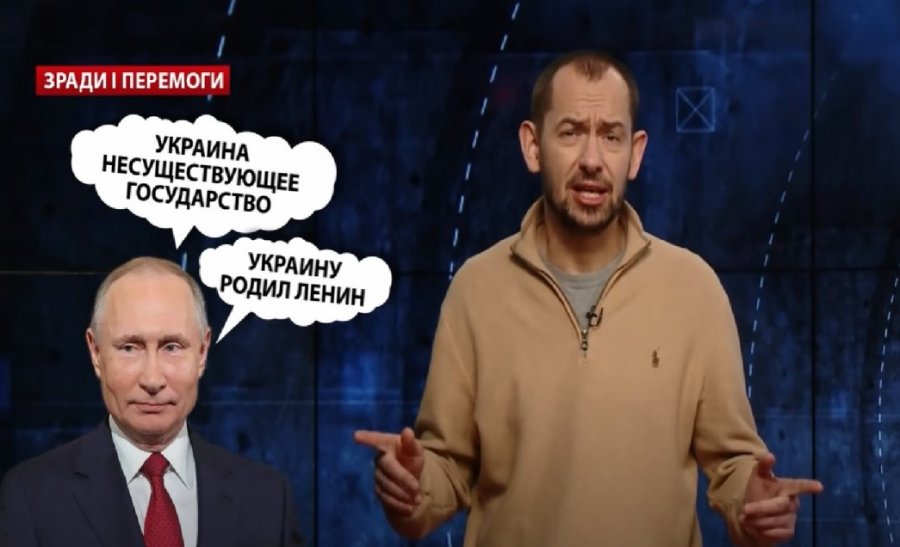Hard-hitting Ukrainian journalist leaves Russia after accusation of ‘incitement to enmity against Russians'

Roman Tsymbaliuk has left Russia, fearing for his personal security after being summoned to a Moscow prosecutor over pro-Ukrainian sentiments. Although the prosecutor who had suspected the UNIAN correspondent of ‘inciting enmity’ did not turn up, Tsymbaliuk sees no guarantee that there will not be a second attempt to summons, or prosecute, him.
According to UNIAN, Tsymboliuk is, or was, the only accredited Ukrainian journalist in the Russian Federation. He is best known for his hard-hitting questions to Russian President Vladimir Putin about Russia’s aggression and ongoing imprisonment of Ukrainian political prisoners, as well as his very blunt reports on YouTube.
On 8 December 2021, the state-funded television channel RT reported that Tsymbaliuk had been summoned for questioning to the Moscow prosecutor’s office. Citing an unnamed source, RT stated that the summons was over Tsymbaliuk’s YouTube videos which allegedly “contain elements of incitement to enmity and hatred in relation to members of the social groups “Russians” and “representatives of the authorities in Russia”. Administrative proceedings were being considered, the report continued, under Article 20.3.1 of Russia’s code of administrative offences (incitement to enmity). The report was very widely circulated, and embellished upon, in the Russian media.
On 24 December, Nikolai Polozov, the Russian lawyer tirelessly defending many Crimean Tatar and other Ukrainian political prisoners, reported that Tsymbaliuk had been summoned “to give an explanation” to the Moscow central prosecutor’s office that morning but that the individual who had summoned him had not appeared. Another employee asserted that this meant that the summons had been withdrawn, but asked that Polozov (who had attended in Tsymbaliuk’s place) leave their contact details. The mere fact that somebody does not turn up can hardly be viewed as confirmation that a summons has been withdrawn, let alone that the potential charges have been dropped.
In an interview to Hromadske on 3 January 2022, Tsymbaliuk confirmed that he had left Russia after working for UNIAN in Moscow for around 13 years. He explained that he believed that there was a real risk to his personal safety and added that there had been plenty of earlier signals that the Russian authorities had decided to go for the last Ukrainian reporter in Moscow. “Over the past two months, virtually all main figures of the ‘Russian information forces’ have predicted that I will face various problems. One wanted me to be convicted, another said that I was spying, a third published some other crap.” He stresses that there is no certainty that proceedings have been initiated since he has faced verbal harassment for many years. The difference is that recently the Russian media have published various statements, reports from deputies to the Investigative Committee, etc, with the crescendo being the huge hype in the media over the summons on 8 December.
“I will be in no hurry to [go back to] Russia since I don’t want to become one of the Kremlin’s hostages and wait to me exchanged. We have too many people as it is who need to be got out.”
Tsymbaliuk points out that he never planned to stay in Russia, and does not mind if he does not ever return. It is, however, his and Polozov’s task now to ensure that when he next goes abroad, he does not find that Russia has managed to get INTERPOL to put him on the wanted list.
Asked why this has happened now after so many years in Moscow, expressing pro-Ukrainian sentiments, Tsymbaliuk answers that Russia is now changing and no longer feels the need to maintain the illusion of being a democracy. Yes, there were difficulties before, but nothing like this. The regime in Russia is now seeking total control, trying to close themselves off – from YouTube, from independent points of view which, he says, are already almost non-existent.
It appears that the claim about ‘incitement to enmity’ is over the following words: “Dear Russians! You can view us as you like, call as what you will, even using the vocabulary of [Olga] Skabeyeva and [Volodymyr] Solovyov [two of the most notorious propagandists for the current regime]. But be aware that if your soldiers or people without insignia cross Ukraine’s borders with weapons, they will be killed, destroyed like rabid dogs”.
Tsymbaliuk points out that the prosecutor is trying to claim that this constitutes ‘incitement to enmity’ but that they invariably omit the first critical part of his sentence, namely if Russians commit an act of aggression by crossing, armed, onto Ukrainian territory. It is worth noting that several European countries (the UK and Czech Republic, for example) have sentenced their citizens to lengthy terms of imprisonment on terrorism charges for fighting in Donbas on behalf of the Russian and Russian armed and funded militants fighting against the Ukrainian army.
The Ukrainian journalist calls Putin’s “phantom pain regarding empire and himself as emperor” extremely dangerous. “To direct questions as to whether he can guarantee that there will be no attack on Ukraine beyond the borders of occupied territory, he effectively said ‘no’. He said that it’s Ukraine that should guarantee security.” Tsymbaliuk suggests that this means that for Putin, Ukraine, through its very existence is supposed to be threatening Russia.
While suggesting that Ukrainians should panic less about the constant suggestion that Russia could be about to invade more Ukrainian territory, he cannot see inside Putin’s head. He states that the disaster for any territory that Russia seizes is enormous and therefore, “it’s better to be ready, as I said before: if you see a Russian invader on Ukrainian territory with a weapon in his hands, shoot at him. Because, if you don’t, he’ll kill you. Full stop.”
Russia is currently imprisoning at least 11 Ukrainian journalists, including Crimean Tatar Mejlis leader Nariman Dzhelyal, Vladislav Yesypenko; Remzi Bekirov and Osman Arifmemetov.





